Odisha has several success stories of farmer-producer organizations doing decent business. Meet Promila Krishna, 39, Lalita Nayak, 40, Parbati Gadba, 42, Sanadei Dhuruwa, 39, and Nabita Barika, 41, of Kundra block in Odisha’s Koraput district. Except for Promila who is a matriculate, others haven’t attended school beyond the elementary level. However, while introducing themselves to a newcomer, they wouldn’t hesitate to announce their designation: director, promoter, etc, of course with a wide grin.
 Together, for the last five years, they have been successfully leading Mauli Ma Producer Company Limited (MMPCL) in Kundra. Promila is the chairperson of this enterprise of 522, all-women, shareholders drawn from 36 non-descript villages under eight gram panchayats. “We all can sign our names,” claims Lalita, a director.MMPCL is not alone. Four other such ventures, registered under the Companies Act 2013, operate in Boipariguda, Dasmantpur, Laxmipur, and Bandhugaon blocks of Koraput. A few more are in the process of registration. Approximately, eighty-five percent shareholders (members) of these women-led companies are from Bhumia, Paraja, Banjara, Kondh, Gadaba and Durua tribes. All of them are small or marginal farmers.
Together, for the last five years, they have been successfully leading Mauli Ma Producer Company Limited (MMPCL) in Kundra. Promila is the chairperson of this enterprise of 522, all-women, shareholders drawn from 36 non-descript villages under eight gram panchayats. “We all can sign our names,” claims Lalita, a director.MMPCL is not alone. Four other such ventures, registered under the Companies Act 2013, operate in Boipariguda, Dasmantpur, Laxmipur, and Bandhugaon blocks of Koraput. A few more are in the process of registration. Approximately, eighty-five percent shareholders (members) of these women-led companies are from Bhumia, Paraja, Banjara, Kondh, Gadaba and Durua tribes. All of them are small or marginal farmers.
“There’s enormous interest among the tribal women to start their own venture,” said Ramesh Chandra Swain, senior program manager of CYSD, working in Koraput district for over three decades. Narrating the story of these farmer producer organisations (FPOs), he recalls that earlier, the barter system was in vogue in these areas. Women farmers encountered difficulties in selling their surplus produce and were victims of distress sell. “In 2015, we discussed the idea with them. It took some time, but once convinced, they haven’t looked back.”
The entrepreneurs also acknowledge the CYSD’s constant back-end support. As is the norm, each company goes through the annual audit process and files IT return. Their structure and operational pattern is similar. However, the only male member in each company is the CEO. An educated youth, preferably from a shareholder family, is appointed as CEO at a token monthly salary. He maintains records, prepares the balance-sheet and does the running around on his bike. Mansai Santa, 27, a Kondh graduate is the CEO at MMPCL. The board of directors (BoD) meets on a fixed date, every month. Its responsibilities include, developing business plans, decision-making, investment, input-linkage, convergence (government departments), trader negotiation, audit as well as statutory requirement compliance. Last year, the turnover of MMPCL, Jagarana Farmers Producer Company (Laxmipur) and Boipariguda based Sabujima Producer Company Ltd stood at Rs. 23 lakh, Rs. 17.50 lakh and Rs. 27 lakh, respectively.
However, Dangarrani Farmer’s Producer Company Ltd (Dasmantpur) and Banaprabha Farmer Producer Company (Bandhugaon), both in early days and learning the trade, reported a turnover of less than Rs. 3 lakh. It’s not bad going, though. Forget, luxuries, they lack access to even proper healthcare or education. Till a few years ago, most of these pockets were in the news for Naxal activities.
Each company consists of producer groups at the village level. These groups collect from the shareholders, millet, maize, scented rice, seasonal vegetables and locally available forest goods, tamarind, etc. Though one is free to sell individually, they prefer the bulk trading route which assures better price and rules out chances of exploitation. The companies collect a small amount from the farmers as service charge for product handling (collection, transportation), quality control (measuring moisture parameter) and marketing (finalizing traders and price negotiation). Each company boasts of assets – a desktop computer, weighing machine and moisture meters.
The other source of income is in the form of interest on loans availed to shareholders, mostly for seasonal crops. The amount, a few thousand rupees, is decided on the basis of land size. The borrower can avail loan, either, or both, in cash and kind (seeds, fertilizers). At the time of sale, the capital with interest is deducted and the borrower collects the rest. It’s a win-win equation for both parties.
In 2020, MMPCL, which according to Ramesh has “well-adapted and streamlined lending procedure”, fetched a loan of Rs. 6 lakh. Kamala Bhumia, a promoter, had invested the borrowed amount (Rs. 23,000) on maize farming. Her return: Rs. 70,000. By Kamala’s own admission, she reaped a neat profit of Rs 35,000, that too in six months. Kamala’s fellow friends, Sukmani and Surya Bhumia tell similar stories. While the former took Rs 10,000 and earned Rs 58,000, Surya Bhumia spent the amount (Rs 12,000) on maize cultivation. She sold 15 quintals, at Rs 2,300 a quintal.“A smile on the farmer’s face gives us immense satisfaction,” states Promila. “Our aim is to involve more and more women and grow together,” she adds. Though, MMPCL had begun with 200 shareholders with an initial one-time capital of Rs 200 each, its membership fee has remained unchanged. Promila says they are planning to enhance the shareholder strength to 1,000 by April 2023. Their other target is to own an office building. Though, they claim to have been assured of support by the local MLA, a suitable site is not yet finalized. Every month, they pay a rent of Rs 2,500 for their three-room office at Kundra. However, the immediate task before them is to hold the annual General Body meeting, already cancelled for two years due to Covid-19.
Given the number of shareholders, a large field with enough shade is chosen as the venue for the annual meeting. Depending on the duration of deliberations, arrangements are made for tea, snacks or lunch. However, after the brainstorming event, they unwind, at least, for an hour. “We enjoy our Dhemsa dance,” Lalita and others say in unison, excitedly. With economic empowerment, a perceptible change is visible in the outlook of these women. They are serious about the education of their children. Promila intends to send her teenaged son and daughter for engineering and nursing courses respectively in Bhubaneswar. “Both education and exposure are essential in life,” she thinks. Others echo her sentiment. What surprises more is the awareness level of these illiterate women. Besides, protection of local forests, they are trying to make the villages liquor free. In some villages, they mentioned, liquor consumption has reduced, drastically. A resident of Raniguda recalls that during the Covid-19 period the FPOs played a massive role. From creating awareness, making provision of cooked food for the economically vulnerable groups to distribution of government’s pandemic assistance (rice and money), the women did everything. Apart, they also assisted in the identification of households for support of agricultural intervention and distribution of dry ration kits, seed kits and inputs meant for families depending on non-timber forest produce like tamarind. With markets closed due to lockdowns, the FPOs collected farm produce from villagers and sold at Jeypore and other large towns in the district.
“We are happy that we could do our bit in those tough times,” mentions Subhadra Bhumia, Raniguda’s former Sarpanch and also a promoter. According to former State Information Commissioner and CYSD’s Co-founder, Shri Jagadananda, in remote tribal pockets, illiteracy among the tribal girls and women is still a major challenge; there are other constraints too. For them, to try, set up and run an enterprise is not at all an easy job. As he puts, “When such enterprises thrive against extreme adverse situations, the joy is limitless.”
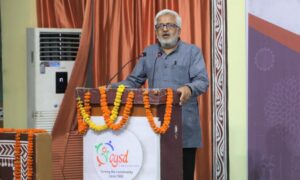 “Poverty is a state, where a person lacks the basic capacity to participate effectively in the society. Poverty in a democracy is a denial of services and opportunities to lead a long, healthy, creative life and enjoy a decent standard of living. We see poverty as an instrument which normally facilitates too much capital to grow. There is great potential of human and social capital for the poor to grow or reserve. People with too much capital are a causality. Therefore, we are focusing on sensitising the community on the development activities undertaken through various flagship schemes and programmes; and also enabling people to understand their roles and responsibilities and expand their capacity towards building a sustainable community.
“Poverty is a state, where a person lacks the basic capacity to participate effectively in the society. Poverty in a democracy is a denial of services and opportunities to lead a long, healthy, creative life and enjoy a decent standard of living. We see poverty as an instrument which normally facilitates too much capital to grow. There is great potential of human and social capital for the poor to grow or reserve. People with too much capital are a causality. Therefore, we are focusing on sensitising the community on the development activities undertaken through various flagship schemes and programmes; and also enabling people to understand their roles and responsibilities and expand their capacity towards building a sustainable community.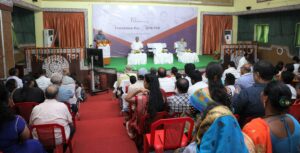 Nations around the world are challenged on how to ensure the benefits of governance and development reach the last mile. When all things are done, what really matters is whether the person at the last mile is feeling the impact of, and getting the benefits of good governance. Democracy calls for a shift from Jamindari to Jan Bhagidari or effective partnership. The partnership is very dynamic which requires relationship building that continues for a longer time. It demands both independence and interdependence in terms of behavioural competency, functional competency, and domain competency. It requires both changes in the mindset and mindset to change. We have to develop an attitude to learning from the community, the CSOs, the government, the media-building narratives, and the academia. Let’s work together and learn from each other. Influencing the state on how to work with other actors including the CSOs; and mobilising the CSOs to work with the government is very critical. Above all, the community is always at the centre. Starting from brainstorming with the community for project formulation/designing, to participatory project implementation, monitoring & evaluation, review-cum-reflection are important for the success of the project.
Nations around the world are challenged on how to ensure the benefits of governance and development reach the last mile. When all things are done, what really matters is whether the person at the last mile is feeling the impact of, and getting the benefits of good governance. Democracy calls for a shift from Jamindari to Jan Bhagidari or effective partnership. The partnership is very dynamic which requires relationship building that continues for a longer time. It demands both independence and interdependence in terms of behavioural competency, functional competency, and domain competency. It requires both changes in the mindset and mindset to change. We have to develop an attitude to learning from the community, the CSOs, the government, the media-building narratives, and the academia. Let’s work together and learn from each other. Influencing the state on how to work with other actors including the CSOs; and mobilising the CSOs to work with the government is very critical. Above all, the community is always at the centre. Starting from brainstorming with the community for project formulation/designing, to participatory project implementation, monitoring & evaluation, review-cum-reflection are important for the success of the project.
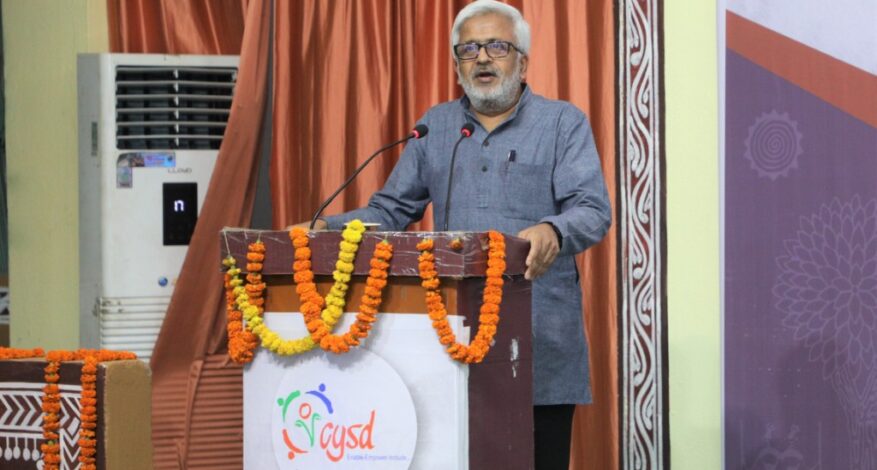
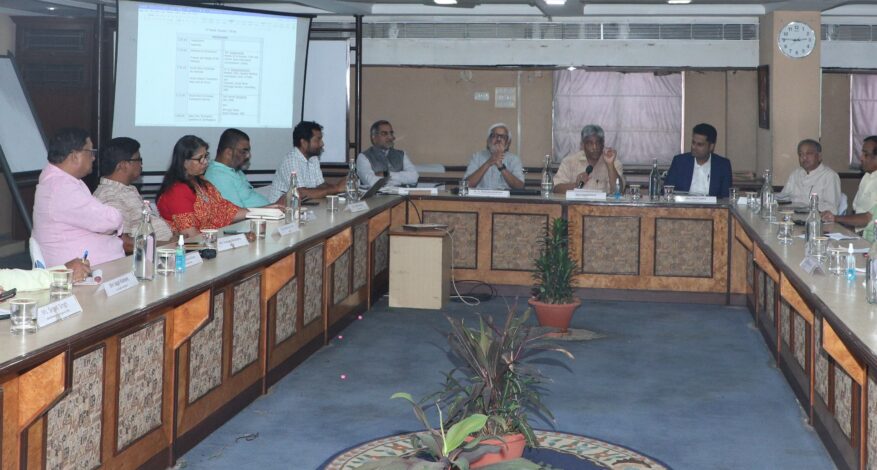
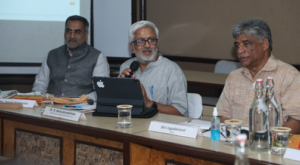 Keeping this in mind, a dialogue of Civil Society on the Social Stock Exchange Framework was organized by CYSD on 23rd March 2023 in Bhubaneswar on the eve of its 41st Foundation Day. Dr. R Balasubramaniam, Founder of GRAAM and Chair of the SSE Advisory Board, currently Member of the Capacity Building Commission, Govt. of India who joined this dialogue assisted the Odishan CSO representatives in clarifying various aspects of the SSE framework. Moreover, a few senior officials like, Mr. Jeevan Sonparote from Securities & Exchange Board of India (SEBI) and Mr. Avik Gupta from National Stock Exchange of India (NSE) also joined the workshop and guided the delegates on how their NPOs can be registered with SSE before initiating fund raising: eligibility criteria for Social Enterprises including Disclosures, Process overview and Value Proposition.
Keeping this in mind, a dialogue of Civil Society on the Social Stock Exchange Framework was organized by CYSD on 23rd March 2023 in Bhubaneswar on the eve of its 41st Foundation Day. Dr. R Balasubramaniam, Founder of GRAAM and Chair of the SSE Advisory Board, currently Member of the Capacity Building Commission, Govt. of India who joined this dialogue assisted the Odishan CSO representatives in clarifying various aspects of the SSE framework. Moreover, a few senior officials like, Mr. Jeevan Sonparote from Securities & Exchange Board of India (SEBI) and Mr. Avik Gupta from National Stock Exchange of India (NSE) also joined the workshop and guided the delegates on how their NPOs can be registered with SSE before initiating fund raising: eligibility criteria for Social Enterprises including Disclosures, Process overview and Value Proposition.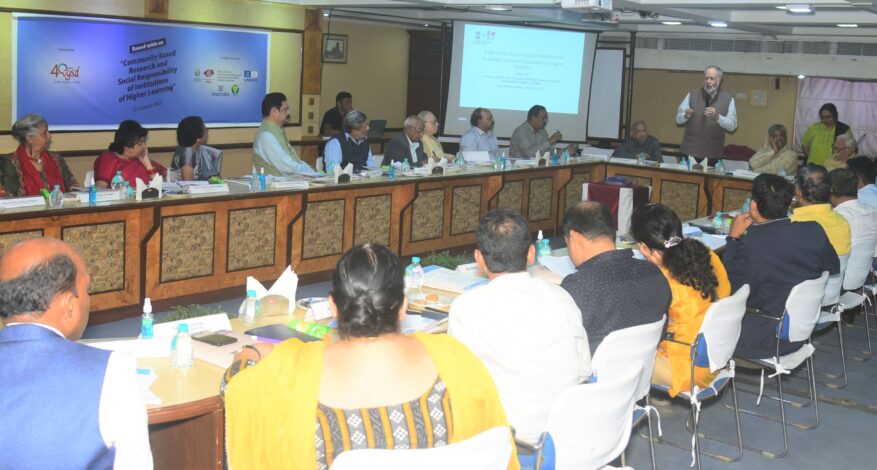
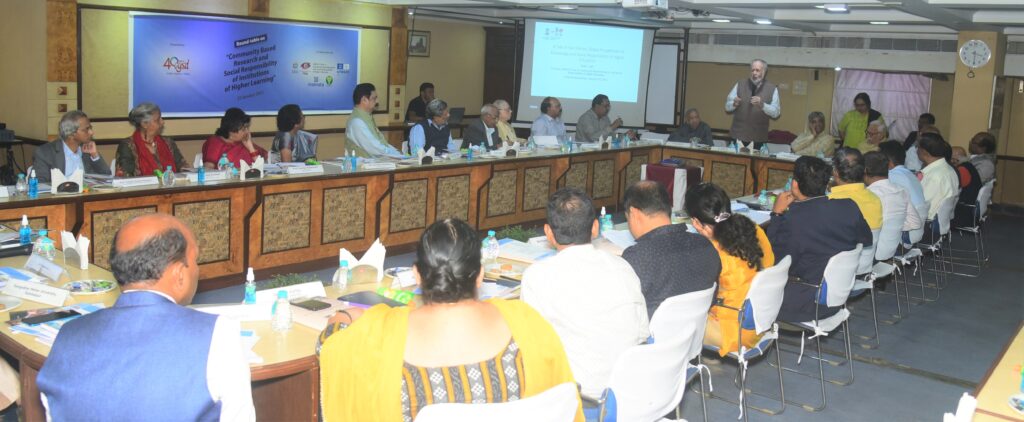 Joining the round-table, Dr. (Mrs.) Pankaj Mittal, Secretary General, Association of Indian Universities, in her key note address highlighted the disconnect between the universities and the society; and the consequences. Higher educational institutions need to bring in social responsibility and community in their vision and development mechanisms to adopt a functional approach to community engagement. University Society Responsibility (USR) is as important as the Corporate Social Responsibility (CSR), she said. Regular interface between the university and the community and exchange of knowledge are very critical to strengthen engagement with the society. The students pursuing higher education need to understand the issues and challenges of the community and develop projects to address them. Therefore, the community knowledge needs to be extracted through research, analyzed, documented and integrated with the university curriculum. The opportunities available under Unnat Bharat Abhiyan (UBA) can be harnessed for the purpose, added Dr. Pankaj.
Joining the round-table, Dr. (Mrs.) Pankaj Mittal, Secretary General, Association of Indian Universities, in her key note address highlighted the disconnect between the universities and the society; and the consequences. Higher educational institutions need to bring in social responsibility and community in their vision and development mechanisms to adopt a functional approach to community engagement. University Society Responsibility (USR) is as important as the Corporate Social Responsibility (CSR), she said. Regular interface between the university and the community and exchange of knowledge are very critical to strengthen engagement with the society. The students pursuing higher education need to understand the issues and challenges of the community and develop projects to address them. Therefore, the community knowledge needs to be extracted through research, analyzed, documented and integrated with the university curriculum. The opportunities available under Unnat Bharat Abhiyan (UBA) can be harnessed for the purpose, added Dr. Pankaj.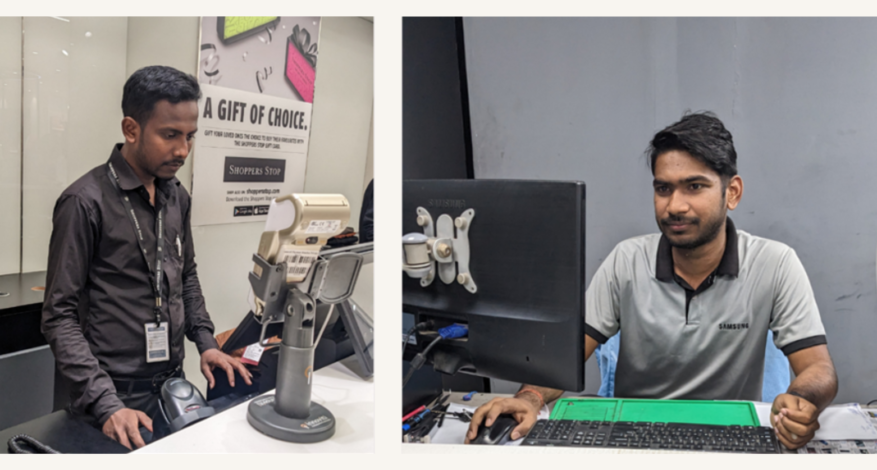
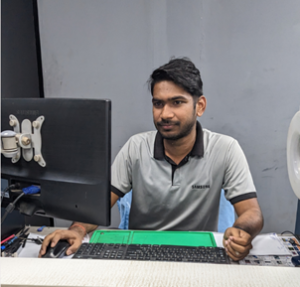 Ranjan Kumar Bhoi is a young man with big dreams, born into a family of daily labourers in Cuttack of Odisha State. Ranjan’s father struggled to make ends meet for his six-member family. Despite this, Ranjan never gave up on his dreams and continued his education until graduation. Unfortunately, financial constraints forced him to discontinue further studies. But, Ranjan’s ambition never wavered, and he soon heard about a short-term training course on ‘Retail Sales Associate’ being offered by CYSD in Bhubaneswar. He enrolled and completed the program, emerging as a confident and skilled sales executive, and got placement in Shoppers Stop with an annual salary of INR 129,600. Ranjan’s journey since receiving the training has been truly remarkable. He is now more confident, committed, and has even started saving for the future. Ranjan’s father is proud of him and grateful for the changes he has seen in his son after joining the program. Ranjan’s newfound skills and confidence have given him the motivation to grow further, and he is determined to make the most of this opportunity. ” The Retail Sales Associate Training course imparted by CYSD was truly a life-changing moment, and I will always remain grateful for creating such opportunity”, says cheerful Ranjan.
Ranjan Kumar Bhoi is a young man with big dreams, born into a family of daily labourers in Cuttack of Odisha State. Ranjan’s father struggled to make ends meet for his six-member family. Despite this, Ranjan never gave up on his dreams and continued his education until graduation. Unfortunately, financial constraints forced him to discontinue further studies. But, Ranjan’s ambition never wavered, and he soon heard about a short-term training course on ‘Retail Sales Associate’ being offered by CYSD in Bhubaneswar. He enrolled and completed the program, emerging as a confident and skilled sales executive, and got placement in Shoppers Stop with an annual salary of INR 129,600. Ranjan’s journey since receiving the training has been truly remarkable. He is now more confident, committed, and has even started saving for the future. Ranjan’s father is proud of him and grateful for the changes he has seen in his son after joining the program. Ranjan’s newfound skills and confidence have given him the motivation to grow further, and he is determined to make the most of this opportunity. ” The Retail Sales Associate Training course imparted by CYSD was truly a life-changing moment, and I will always remain grateful for creating such opportunity”, says cheerful Ranjan. Similarly, Rabindra Prusty was just like any other young man from his small town in Khurda, Odisha. Coming from a resource poor family, with his father as the sole earning member, Rabindra’s ambition and passion to succeed in life was unmatched. Despite the odds, he managed to complete his intermediate education, making him the highest qualified in his family. When he joined the Retail Sales Associate course offered by CYSD in February 2021, little did he know that it would change his life forever. The training not only helped him groom himself and enhance his digital knowledge but also gave him the confidence to think beyond his limitations. Rabindra’s hard work and dedication paid off when he was placed through the training center at SAMSUNG Care with an annual salary of INR 84,000. His father, who was initially hesitant about his son joining the course, now proudly boasts about the life-changing impact it had on both Rabindra and the family. “My journey from being just another young man from a small town to a successful professional is a testament to the fact that with hard work, dedication and the right opportunities, one can overcome any obstacle and achieve his/her dreams”, says delightful Rabindra.
Similarly, Rabindra Prusty was just like any other young man from his small town in Khurda, Odisha. Coming from a resource poor family, with his father as the sole earning member, Rabindra’s ambition and passion to succeed in life was unmatched. Despite the odds, he managed to complete his intermediate education, making him the highest qualified in his family. When he joined the Retail Sales Associate course offered by CYSD in February 2021, little did he know that it would change his life forever. The training not only helped him groom himself and enhance his digital knowledge but also gave him the confidence to think beyond his limitations. Rabindra’s hard work and dedication paid off when he was placed through the training center at SAMSUNG Care with an annual salary of INR 84,000. His father, who was initially hesitant about his son joining the course, now proudly boasts about the life-changing impact it had on both Rabindra and the family. “My journey from being just another young man from a small town to a successful professional is a testament to the fact that with hard work, dedication and the right opportunities, one can overcome any obstacle and achieve his/her dreams”, says delightful Rabindra.

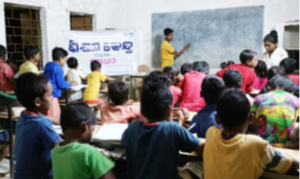 It was a calm Sunday morning in Mendukuli village, one of the southernmost remote areas – once a Maoist-dominated district, Malkangiri, in the state of Odisha. Cutting through the calmness of the morning, chants of 20-odd highly enthusiastic children were reverberating in the village community learning centre. They were learning backwards counting through a song while around 40 others were busy doing their class-appropriate studies. It was the picture of a learning centre set up by the villagers. Mendukuli under Dalapatiguda gram panchayat in Mathili block is one of the few tribal-dominated villages, where residents took it upon themselves to compensate for the learning loss of their children incurred during the school closure due to the Covid-induced lockdown.
It was a calm Sunday morning in Mendukuli village, one of the southernmost remote areas – once a Maoist-dominated district, Malkangiri, in the state of Odisha. Cutting through the calmness of the morning, chants of 20-odd highly enthusiastic children were reverberating in the village community learning centre. They were learning backwards counting through a song while around 40 others were busy doing their class-appropriate studies. It was the picture of a learning centre set up by the villagers. Mendukuli under Dalapatiguda gram panchayat in Mathili block is one of the few tribal-dominated villages, where residents took it upon themselves to compensate for the learning loss of their children incurred during the school closure due to the Covid-induced lockdown. When the world endured a huge learning loss in schools, the community-managed centres in several villages in Mathili, one of the most backward blocks in Odisha, are effectively making up for the loss, pointed out block education officer Sashibhushan Mishra. By inculcating learning habits among children, these centres help in a great way in enhancing the school attendance and checking the dropout rates, added Sashibhushan.
When the world endured a huge learning loss in schools, the community-managed centres in several villages in Mathili, one of the most backward blocks in Odisha, are effectively making up for the loss, pointed out block education officer Sashibhushan Mishra. By inculcating learning habits among children, these centres help in a great way in enhancing the school attendance and checking the dropout rates, added Sashibhushan.